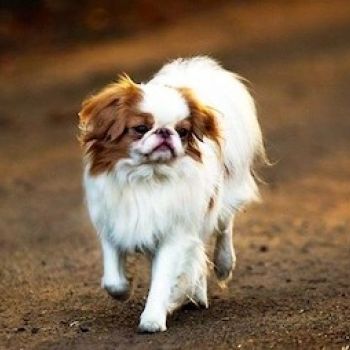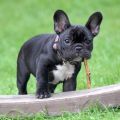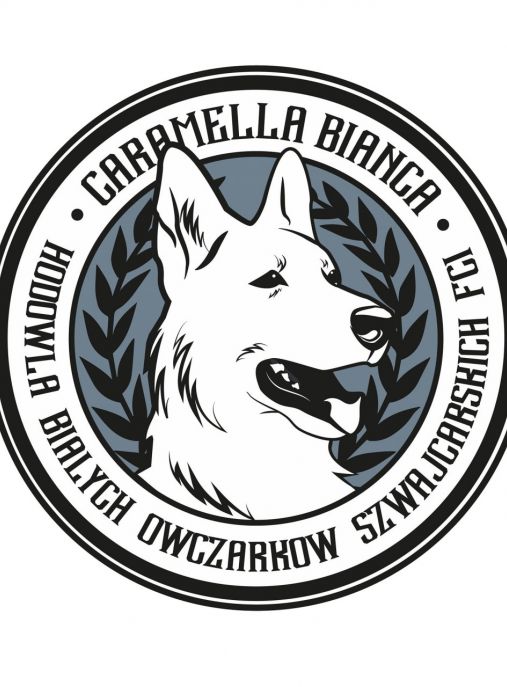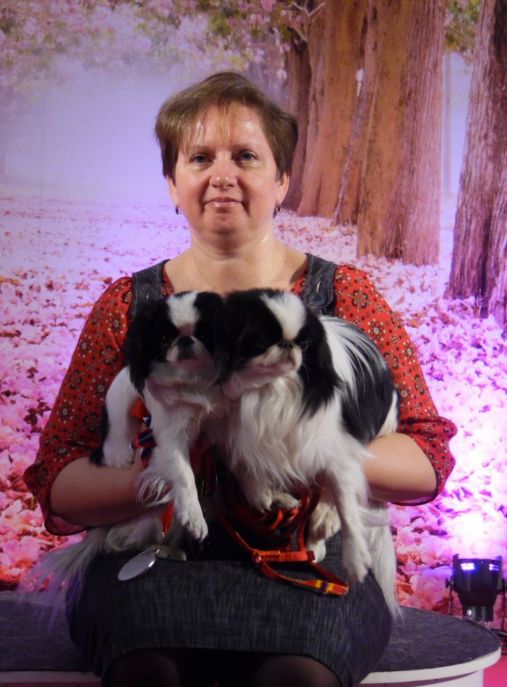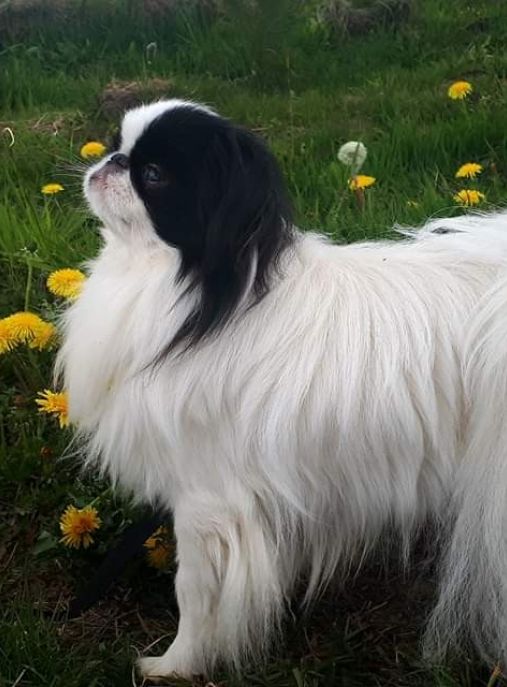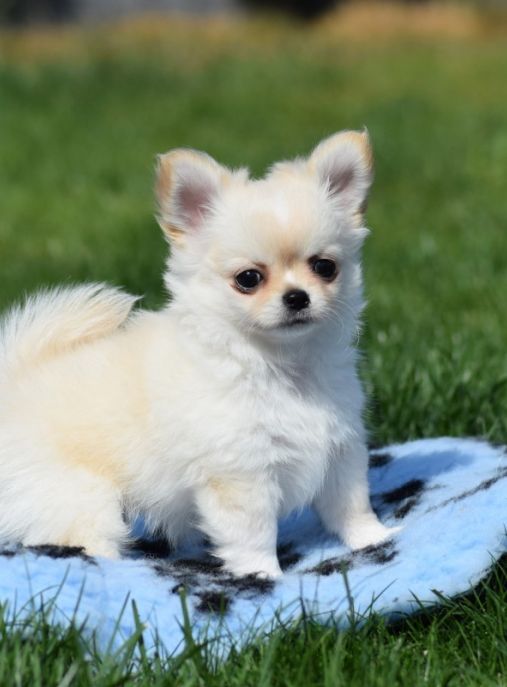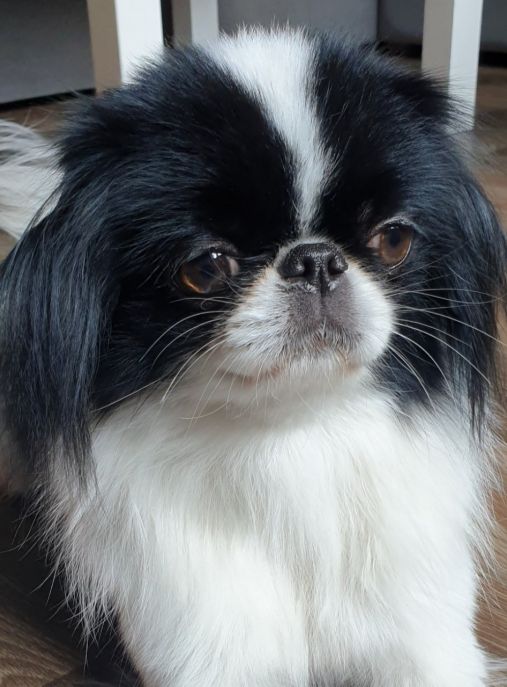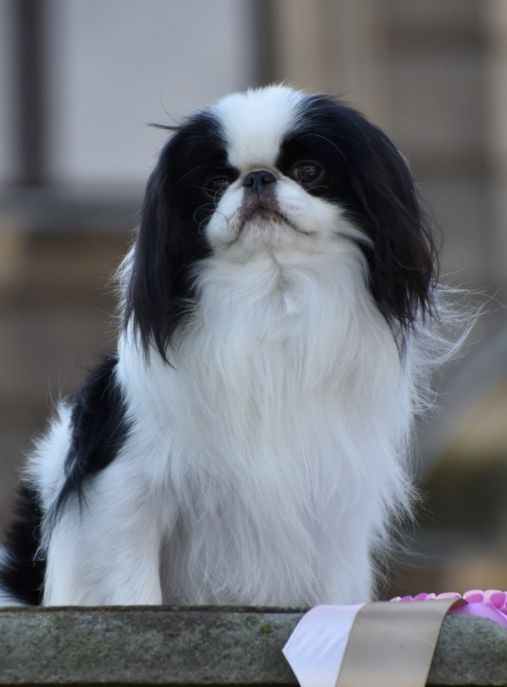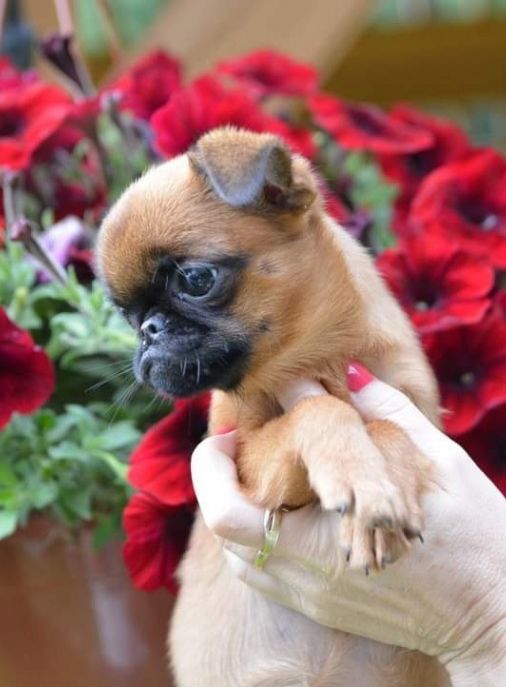The Japanese Chin, also known as the Japanese Spaniel, is a small and elegant toy breed that originated in Japan. With its distinctive appearance and charming personality, this breed has captured the hearts of dog lovers around the world. Known for their expressive eyes, silky coat, and graceful movements, Japanese Chins are truly a sight to behold.
The history of the Japanese Chin can be traced back to ancient times in Asia. It is believed that they were originally bred as companions for Japanese nobility and were highly regarded as symbols of prestige and luxury. These dogs were often given as gifts to foreign dignitaries, further spreading their popularity across different countries.
According to the FCI (Fédération Cynologique Internationale) typology, the Japanese Chin belongs to Group 9 - Companion and Toy Dogs. This group includes various small breeds that were primarily bred for companionship and are known for their affectionate nature and adaptability to different living environments.
Japanese Chins are specifically bred for companionship and are excellent family pets. They thrive on human interaction and are known for their loyalty and devotion to their owners. These dogs form strong bonds with their families and are often described as being gentle, affectionate, and playful. They are also known to be good with children and other pets, making them a great addition to any household.
In terms of physical characteristics, the Japanese Chin is a small breed with a compact and well-balanced body. They typically weigh between 4 to 9 pounds (1.8 to 4 kg) and stand at a height of around 8 to 11 inches (20 to 28 cm) at the shoulder. Their coat is long, silky, and straight, with feathering on the ears, tail, and legs. The most common coat colors include black and white, red and white, or black and white with tan points.
The average life expectancy of a Japanese Chin is around 10 to 12 years, although with proper care and a healthy lifestyle, they can live even longer. It is important to note that Japanese Chins are prone to certain health issues, including heart problems, eye conditions, and respiratory difficulties. Regular veterinary check-ups and a balanced diet are essential to ensure their well-being.
One interesting fact about Japanese Chins is their unique way of sitting. They often sit upright on their hind legs, resembling a human-like posture. This behavior, known as the "Chin sit," is not only adorable but also showcases their regal and dignified nature.
Another fascinating aspect of this breed is their expressive eyes. Japanese Chins have large, round eyes that are set wide apart, giving them a wide-eyed and innocent expression. Their eyes are dark and lustrous, adding to their overall charm and appeal.
In conclusion, the Japanese Chin is a delightful and captivating breed that brings joy and companionship to its owners. With its rich history, elegant appearance, and affectionate nature, it is no wonder that this breed continues to be cherished by dog enthusiasts worldwide. Whether as a lapdog or a family pet, the Japanese Chin is sure to bring love and happiness to any home.
The Japanese Chin, also known as the Japanese Spaniel, is a small and elegant toy breed that originated in Japan. Renowned for their distinctive appearance and charming personality, Japanese Chins make wonderful companions and are adored by many dog enthusiasts. In this text, we will delve into the character of Japanese Chin dogs, exploring their behavior, and providing insights on how to raise and train them.
Japanese Chins are known for their gentle and affectionate nature. They form strong bonds with their owners and thrive on human companionship. These dogs are incredibly loyal and will often become attached to one particular person in the household, although they are generally friendly towards everyone they meet. Their loving and devoted nature makes them excellent family pets, as they get along well with children and other animals when properly socialized.
One of the most distinctive features of Japanese Chins is their playful and mischievous personality. They have a natural curiosity and love to explore their surroundings. Their agile and graceful movements, combined with their expressive eyes and silky coat, give them an air of elegance and charm. Japanese Chins are known to be quite entertaining, often engaging in amusing antics to capture the attention of their owners.
Despite their small size, Japanese Chins possess a confident and independent spirit. They are intelligent dogs and can be quite stubborn at times. This can make training a bit challenging, but with patience, consistency, and positive reinforcement methods, they can be successfully trained. Early socialization is crucial for Japanese Chins to ensure they grow up to be well-rounded and well-behaved dogs.
When it comes to exercise, Japanese Chins have moderate energy levels. They enjoy daily walks and playtime, but they are not overly demanding in terms of exercise. Due to their brachycephalic (short-nosed) structure, they are sensitive to heat and should not be overexerted in hot weather. Japanese Chins are well-suited for apartment living as they adapt well to small spaces, but they still require mental stimulation and regular exercise to prevent boredom.
Grooming a Japanese Chin is relatively easy, thanks to their luxurious and silky coat. Regular brushing is necessary to prevent matting and keep their coat looking its best. They are considered a low-shedding breed, making them suitable for individuals with allergies. Additionally, their large, round eyes require regular cleaning to prevent any potential eye issues.
In conclusion, Japanese Chins are delightful and affectionate dogs with a playful and mischievous personality. They thrive on human companionship and are well-suited for families and individuals alike. While they can be a bit stubborn, with proper training and socialization, they can become well-behaved and obedient pets. Their moderate exercise needs and low-shedding coat make them suitable for various living situations. If you are looking for a small, loving, and entertaining companion, the Japanese Chin may be the perfect breed for you.
The Japanese Chin is a small and elegant toy breed known for its distinctive appearance and charming personality. Caring for a Japanese Chin requires attention to their specific needs to ensure their well-being and happiness. Here are some tips on how to care for Japanese Chin dogs, including what to do and what not to do:
1. Grooming: Japanese Chins have a luxurious, silky coat that requires regular grooming. Brush their coat at least two to three times a week to prevent matting and tangles. Pay extra attention to their feathered ears, tail, and chest. Regular bathing is also necessary to keep their coat clean and healthy.
2. Exercise: Despite their small size, Japanese Chins are active dogs and need regular exercise. Daily walks or playtime in a secure, fenced yard will help them burn off energy. However, avoid excessive exercise as they are prone to respiratory issues. Be cautious during hot weather to prevent overheating.
3. Socialization: Japanese Chins are social dogs and thrive on human companionship. They can be shy or reserved around strangers, so early socialization is crucial. Introduce them to various people, animals, and environments to help them develop confidence and prevent behavioral issues.
4. Training: Japanese Chins are intelligent and eager to please, making them relatively easy to train. Use positive reinforcement techniques such as treats, praise, and rewards to motivate them. However, avoid harsh training methods as they are sensitive and may become fearful or anxious.
5. Dental Care: Dental hygiene is essential for Japanese Chins as they are prone to dental issues. Brush their teeth regularly using a dog-specific toothbrush and toothpaste. Provide dental chews or toys to help maintain their oral health.
6. Health Care: Regular veterinary check-ups are crucial to monitor the overall health of your Japanese Chin. Vaccinations, parasite prevention, and dental examinations should be part of their routine care. Additionally, be aware of breed-specific health concerns such as patellar luxation, heart murmurs, and eye problems. Early detection and treatment can help manage these conditions effectively.
7. Temperature Control: Japanese Chins are sensitive to extreme temperatures. They are more comfortable in moderate climates and should be kept indoors in hot or cold weather. Provide them with a cozy bed, and avoid exposing them to drafts or direct sunlight.
8. Nutrition: Feed your Japanese Chin a high-quality, balanced diet appropriate for their age, size, and activity level. Consult with your veterinarian to determine the right portion sizes and feeding schedule. Avoid overfeeding, as Japanese Chins are prone to obesity, which can lead to various health issues.
What not to do:
1. Do not leave your Japanese Chin alone for extended periods. They thrive on companionship and may develop separation anxiety if left alone for too long.
2. Do not use physical punishment or harsh training methods. Japanese Chins respond best to positive reinforcement and gentle guidance.
3. Do not allow your Japanese Chin to jump from heights or engage in strenuous activities that could strain their delicate bones and joints.
4. Do not neglect their dental care. Poor oral hygiene can lead to dental diseases and discomfort.
5. Do not expose your Japanese Chin to extreme temperatures. They are not well-suited for outdoor living and should be kept indoors in a comfortable environment.
By following these tips and providing the recommended care, you can ensure that your Japanese Chin remains healthy, happy, and cherished as a beloved companion.
The Japanese Chin, also known as the Japanese Spaniel, is a small and elegant toy breed that originated in Japan. One of the distinctive features of this breed is its beautiful and unique coat color. The common color of Japanese Chin dogs is predominantly white, with patches of black or red.
The white color is the base of the Japanese Chin's coat and is usually seen on the majority of their body. It is a pure and bright white, giving them an appearance of purity and grace. This pristine white color is often associated with the breed's regal and aristocratic history, as they were once cherished by Japanese nobility.
Interspersed within the white coat are patches of black or red, which add a striking contrast and enhance the overall beauty of the Japanese Chin. The black patches are usually found on the ears, around the eyes, and on the back, creating a captivating pattern against the white background. These black markings are often referred to as "thumbprints" due to their small and distinct shape, resembling the impression of a thumb.
In some Japanese Chin dogs, the red patches can be seen instead of black. These red patches are usually found on the face, ears, and tail. The red color can range from a deep mahogany to a lighter shade of chestnut, adding warmth and vibrancy to the overall appearance of the dog.
The distribution and size of the black or red patches can vary from one Japanese Chin to another. Some dogs may have larger patches that cover a significant portion of their body, while others may have smaller and more scattered patches. This unique combination of white, black, and red creates a visually stunning and eye-catching coat that sets the Japanese Chin apart from other breeds.
It is worth mentioning that while the white base color with black or red patches is the most common, there are also Japanese Chin dogs that exhibit different coat colors. These variations can include black and white, red and white, or even tri-color combinations. However, the predominantly white coat with black or red patches remains the most iconic and recognizable coloration for this breed.
In conclusion, the common color of Japanese Chin dogs is a pristine white coat with patches of black or red. This unique color combination, along with their elegant and graceful appearance, contributes to the breed's charm and allure. Whether it is the striking black thumbprints or the warm red patches, the coat of a Japanese Chin is a true testament to their beauty and distinction.
The Japanese Chin, also known as the Japanese Spaniel, is a small and elegant toy breed that originated in Japan. Known for their distinctive appearance and charming personality, these dogs make wonderful companions. When it comes to their health, Japanese Chins are generally a robust breed, but like any other dog, they can be prone to certain health issues. In this text, we will explore the most common diseases found in Japanese Chin dogs and provide tips on how to care for their overall health.
One of the most prevalent health concerns in Japanese Chins is patellar luxation. This condition occurs when the kneecap (patella) slips out of its normal position, causing discomfort and lameness. Patellar luxation can range from mild to severe, and in some cases, surgical intervention may be required. Regular exercise and maintaining a healthy weight can help prevent or minimize the risk of this condition.
Another common health issue in Japanese Chins is dental problems. Due to their small size and compact mouth structure, these dogs are prone to dental overcrowding, tooth decay, and gum disease. It is crucial to establish a regular dental care routine, including daily tooth brushing with a dog-specific toothpaste and regular dental check-ups with a veterinarian. Providing appropriate chew toys and dental treats can also help promote good oral health.
Japanese Chins are also susceptible to eye problems, such as cataracts and progressive retinal atrophy (PRA). Cataracts can cause cloudiness or opacity in the lens of the eye, leading to vision impairment or blindness. PRA, on the other hand, is a degenerative disease that gradually leads to the loss of vision. Regular eye examinations by a veterinary ophthalmologist can help detect these conditions early on, allowing for timely treatment or management options.
Heart conditions, particularly mitral valve disease, are also seen in Japanese Chins. Mitral valve disease occurs when the valve between the left atrium and left ventricle of the heart becomes thickened and fails to function properly. Regular veterinary check-ups, including cardiac evaluations, can help monitor the heart health of Japanese Chins and detect any abnormalities early.
To ensure the overall health and well-being of Japanese Chin dogs, it is essential to provide them with a balanced diet that meets their nutritional needs. High-quality dog food, specifically formulated for small breeds, is recommended. Regular exercise is crucial to maintain a healthy weight and prevent obesity, which can exacerbate certain health conditions.
Regular veterinary check-ups are vital for early detection and prevention of potential health issues. Vaccinations, parasite prevention, and routine blood tests should be a part of their healthcare regimen. Grooming is also an important aspect of Japanese Chin care. Their luxurious coat requires regular brushing to prevent matting and skin issues.
In conclusion, while Japanese Chins are generally healthy dogs, they can be prone to certain health conditions such as patellar luxation, dental problems, eye issues, and heart conditions. By providing proper care, including regular veterinary check-ups, a balanced diet, exercise, dental care, and grooming, you can help ensure the overall health and longevity of your beloved Japanese Chin companion.
The Japanese Chin is a small and elegant breed known for its distinctive appearance and charming personality. When it comes to their nutrition, providing a well-balanced diet is crucial for their overall health and well-being. This breed has specific dietary requirements that should be taken into consideration to ensure they receive the necessary nutrients. Here is an extensive description of the nutrition of Japanese Chin dogs, along with advice on feeding and things to avoid.
First and foremost, it's important to choose high-quality dog food that is specifically formulated for small breeds. Look for a brand that uses real meat as the primary ingredient and avoids fillers, artificial additives, and by-products. The food should be rich in protein, healthy fats, and essential vitamins and minerals.
The ideal diet for a Japanese Chin should consist of a combination of dry kibble and wet food. Dry kibble helps maintain dental health by reducing plaque and tartar buildup, while wet food provides additional moisture and can be more palatable for picky eaters. It's recommended to consult with a veterinarian to determine the appropriate portion sizes based on your dog's age, weight, and activity level.
Protein is an essential component of a Japanese Chin's diet. It helps support muscle development and repair, as well as providing energy. Good sources of protein for dogs include chicken, turkey, fish, and lamb. However, it's important to avoid feeding them raw or undercooked meat, as it can pose a risk of bacterial contamination.
In addition to protein, Japanese Chins require a moderate amount of healthy fats in their diet. Fats provide a concentrated source of energy and help maintain healthy skin and coat. Look for dog food that includes omega-3 fatty acids, such as fish oil or flaxseed, as they offer numerous health benefits.
Carbohydrates are another important component of a balanced diet for Japanese Chins. Opt for complex carbohydrates like brown rice, sweet potatoes, and whole grains. These provide a steady release of energy and are easier to digest compared to simple carbohydrates found in processed foods.
While it's essential to provide a nutritious diet, there are certain foods that should be avoided as they can be toxic or harmful to Japanese Chins. Some common foods to avoid include chocolate, caffeine, grapes, raisins, onions, garlic, and anything containing xylitol. These can cause severe health issues ranging from gastrointestinal upset to organ failure.
It's also important to monitor your Japanese Chin's weight and adjust their diet accordingly. Obesity can lead to various health problems, including joint issues and heart disease. Avoid overfeeding and provide regular exercise to keep them fit and healthy.
Lastly, always ensure that your Japanese Chin has access to fresh, clean water at all times. Hydration is crucial for their overall health and helps maintain proper organ function.
In conclusion, providing a well-balanced and nutritious diet is essential for the health and well-being of Japanese Chin dogs. Choose high-quality dog food specifically formulated for small breeds, focusing on real meat, healthy fats, and complex carbohydrates. Avoid toxic foods and monitor their weight to prevent obesity. By following these guidelines and consulting with a veterinarian, you can ensure your Japanese Chin receives the optimal nutrition they need to thrive.

